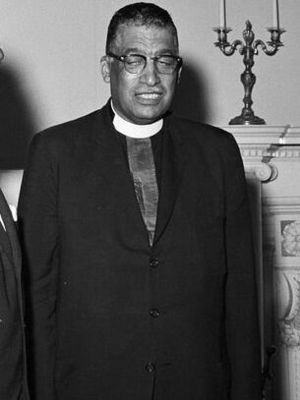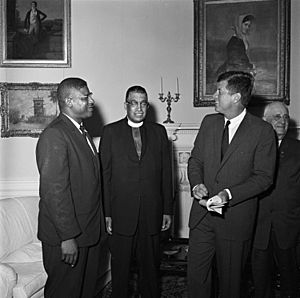Stephen Gill Spottswood facts for kids
Quick facts for kids
Stephen G. Spottswood
|
|
|---|---|

Spottswood in 1961
|
|
| Born | July 18, 1897 |
| Died | December 2, 1974 (aged 77) Washington, DC
|
| Occupation | Bishop of the AMEZ Church, chairman of the NAACP |
Stephen Gill Spottswood (born July 18, 1897 – died December 2, 1974) was an important religious leader. He was also a strong voice for civil rights in the United States. He is best known for his work as a bishop in the African Methodist Episcopal Zion Church (AMEZ). He also served as the chairman of the National Association for the Advancement of Colored People (NAACP).
His important papers are kept at the Amistad Research Center at Tulane University.
Contents
Early Life and Education
Stephen Spottswood was born in Boston, Massachusetts. He was the only child of Mary Elizabeth and Abraham Lincoln Spottswood. He went to high school at Cambridge Rindge and Latin School. He also attended Freeport High School in Maine.
He continued his studies at Albright College. There, he earned a degree in history in 1917. He also studied at Gordon Divinity School and Yale Divinity School. At Yale, he earned his doctorate degree.
Religious Leadership Journey
After college, Spottswood became an assistant pastor. This was at the First Evangelical United Brethren Church in Cambridge, Massachusetts. Soon after, he joined the African Methodist Episcopal Zion Church (AMEZ).
From 1919 to 1936, he led several churches across the country. He founded the First AMEZ Church of Lowell in Lowell, Massachusetts. He also served at Green Memorial AMEZ Church in Portland, Maine. Other churches included Varick Memorial AMEZ Church in New Haven, Connecticut. He also led Goler Memorial AMEZ Church in Winston-Salem, North Carolina. He served at Jones Tabernacle AMEZ Church in Indianapolis, Indiana. Later, he was at St. Luke AMEZ Church in Buffalo, New York. His last church before becoming a bishop was John Wesley AMEZ Church in Washington, D.C..
In 1952, while in Washington, he was chosen as the 58th bishop of the AMEZ Church. He continued to serve in different church areas throughout the 1950s and 1960s.
Fighting for Civil Rights with the NAACP
Spottswood joined the NAACP in 1919. The NAACP is a group that works for equal rights for all people. He was a strong supporter of racial equality his whole life. He took part in many public protests. These included sit-ins, boycotts, and picket lines. He believed these actions, which affected money, were good ways to make changes happen.
He became the president of the NAACP's Washington branch in 1947. In 1955, he was elected to the national board of the NAACP. He became vice-president in 1959. Finally, in 1961, he became the chairman. He held this important role until 1975. He was known for speaking out strongly against those who opposed civil rights. He was especially critical of the Nixon administration.

Speaking Out at the 1970 NAACP Convention
Stephen Spottswood was known for being a very direct speaker. He often got media attention for his political comments. In 1970, at the 61st yearly NAACP meeting in Cincinnati, he gave a famous speech. Spottswood was 72 years old at the time.
In his speech, he warned people about segregationist governor George Wallace. Wallace, from Alabama, was running for president. He had started to talk about being more positive on race issues. Spottswood also spoke against racism in policing. He said that "killing black Americans has been the 20th-century pastime of our police."
His strongest criticism was aimed at President Richard Nixon. He said Nixon's government was "anti-Negro." Spottswood stated it was the first time since 1920 that a national government had worked against the needs of its largest minority group. He criticized Nixon for cutting programs for housing, poverty, and equal chances. He also accused Republicans of trying to weaken the Voting Rights Act and school desegregation.
About Nixon's view on busing students, Spottswood said: "Nixon does not want to abolish busing for the 20 million children bused every day for educational and social purposes. He just wants to keep 2.7 million children from being bused for desegregation purposes." He then declared that the NAACP was "in a state of war against President Nixon."
After the meeting, many Black newspapers supported Spottswood. The Crisis magazine shared many of these news stories. Other newspapers had mixed reactions. Some strongly agreed, while others disagreed. Leonard Garment, a White House advisor, said Spottswood's claims were "unfair and disheartening." Another AMEZ bishop, C. Eubank Tucker, said Spottswood's claims were "unjustified." He also accused the NAACP of getting money from the Democratic Party. The NAACP denied this and said Tucker was loyal to the Republican Party. Spottswood called Tucker a "falsifier" and defended his "anti-Negro" statement.
At the NAACP meeting the next year, Spottswood spoke again. He softened the NAACP's view on Nixon. He admitted that Nixon's government had taken some steps that earned "cautious and limited approval" from Black Americans. His colleague Roy Wilkins had said that Nixon's policies were "only 95 percent anti-black" in the months after Spottswood's 1970 speech.
Personal Life and Legacy
In 1919, Stephen Spottswood married Viola Estelle Booker. They had one son and four daughters. Sadly, Viola died in a fire in 1953. In 1969, he married Mattie Brownita Johnson Elliott.
Spottswood retired as a bishop of the AMEZ Church in 1972. He passed away from cancer on December 2, 1974, at age 77. After his death, his important papers were given to the Amistad Research Center at Dillard University.
 | Janet Taylor Pickett |
 | Synthia Saint James |
 | Howardena Pindell |
 | Faith Ringgold |

